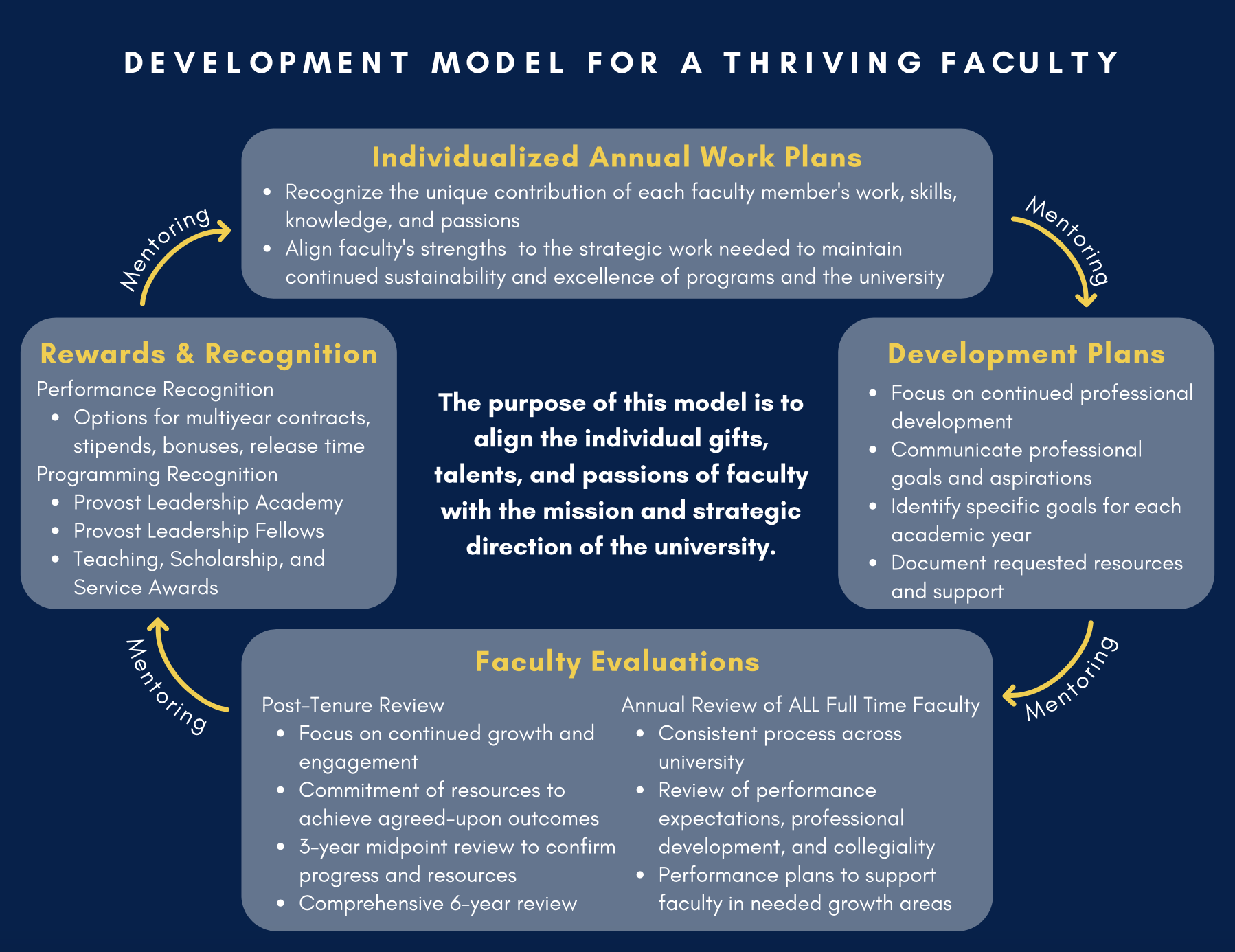The long-term success of Marian University depends upon the interplay of a talented, dynamic, and diverse faculty and the ability of the university to deliver high quality academic programs built on student engagement. Our ability to provide an education distinguished in its ability to prepare transformative leaders for service to the world will be rooted in our faculty’s ability to foster transformative relationships with our students.
A task force of elected faculty from across the university was brought together to assess how we support, retain, and evaluate our faculty in order to build a dynamic, thriving faculty. Their charge included addressing the following:
The task force made several recommendations in the following four specific areas 1) Documenting and defining the work of faculty; 2) Mentoring faculty through their work; 3) Recognition and rewarding of work of faculty and 4) Assessing the work of faculty. This resulted in the creation of the Development Model for a Thriving Faculty (click to expand).

The heart of the Development Model for a Thriving Faculty is the belief that each and every faculty member brings unique passions, gifts, and talents to Marian University. Alignment of these with the strategic direction and work of the university should allow each individual faculty member and the university, as a whole, to thrive.
When faculty focus on the work they are most interested and passionate they are able to enthusiastically do their very best work for our students and the organization. While all faculty will have teaching, service, and scholarship expectations to fulfill, there is latitude in the assignment and recognition of their work. This will allow those who excel at advising to spend more time with their students. Those who enjoy administrative and service projects can use their talents to assist the university plan and manage processes and policies. Research and scholarly activities can be more focused and see more results by those who flourish in the labs, archives, and community.
The foundation of this model will be a switch from the current work load of classes to faculty load units (FLUs) which are primarily based on generated credit hours. Instead of having faculty work a 4 / 4 teaching load and receiving a course release for administrative or research activities, full-time faculty will now be expected to carry 450 to 550 faclty load units an academic year. An overview of Faculty Load Units is available on the Policies and Procedures page.
This model also allows much of the “hidden” work faculty do to be documented, recognized, and rewarded.
The College of Arts and Sciences is piloting this model in 2022-2023 and will it be reviewed and modified as we learn more.
The purpose of the Professional Development Plan (PDP) is to document the professional needs and career plans of the individual faculty member. This plan should clearly communicate the career aspirations of the faculty member in the areas of teaching, service, and scholarship, as well as the immediate professional goals for the academic year.
The Professional Development Plan is updated annually in Faculty Success (formally Digital Measures) and used by the Office of the Provost and the schools and colleges to assist in the planning and allocation of development resources.
The PDP and the faculty member’s accomplishment of the indicated objectives for the current year will be part of the annual review process and periodic reviews for promotion, tenure, and contracts. As such, they will be made available to the Promotion and Tenure committee, Deans, and the Office of the Provost.
This is accomplished through the use of Faculty Success (formally Digital Measures) using the process outlined here: Professional Development Plan Procedure.The goals of the annual faculty evaluation process are:
This is accomplished through the use of Faculty Success (formally Digital Measures) using the process outlined here: Annual Faculty Evaluation Instructions.
A key component of the Development Model for a Thriving Faculty is recognizing and rewarding the work of the faculty. This will happen through how we manage the faculty member’s employment agreement, the provision of leadership development and training, and acknowledging exemplary work through teaching, scholarship, and service awards.
The Office of the Provost will be working with the Personnel Policies Committee to establish:
A variety of leadership development and managerial training opportunities are also being developed. These include:
Finally, we are working to establish a variety of awards to recognize the exemplary teaching, service, and scholarship our faculty continually provide.